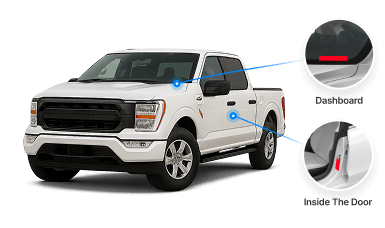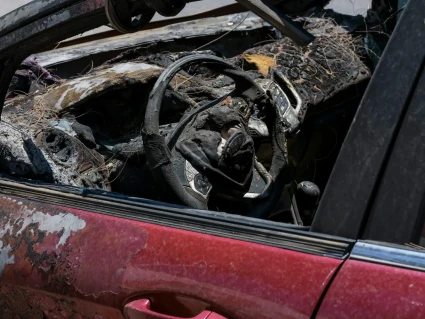
What Is a VIN Swap?
Discover the risks and legal implications of VIN swaps, and learn how to prote...
Enter any Kansas license plate number and get the VIN, title status, accident history, and market value in under 30 seconds
Looking for the VIN?
Here is there you’ll find it:

Kansas license plate lookup is an online vehicle check by Kansas state license plate number, allowing you to get the vehicle history: VIN, characteristics, accident records, titles, mileage, etc.
Plate-to-VIN Match
EpicVIN instantly resolves a Kansas plate to the vehicle’s 17-character VIN - no manual VIN decoding required.
Instant Check
We cross-check NMVTIS and trusted partner records for Kansas vehicles, surfacing title brands, registration events, theft/salvage activity, and inspection history.
Vehicle History Report
Get a quick snapshot for Kansas vehicles: accidents/damage, title status, mileage readings (incl. inspection results where available), and open recalls—without exposing personal owner details.
Expect to see the VIN, basic vehicle specs, and any reported incidents (e.g., accidents, salvage titles, or recalls). Private owner details are not included, keeping the process legal and privacy-safe.
Reports never include restricted PII such as the owner’s name or address, live ALPR location, driver’s license, or insurance numbers. Under the DPPA and applicable state privacy law, results are for vehicle information only and not for FCRA-regulated (Fair Credit Reporting Act) decisions.
A Kansas license plate lookup uses the tag number to query public vehicle records. Enter the plate and select Kansas; EpicVIN resolves the VIN and compiles the record from NMVTIS and partner sources (including inspection history where available).
Works with standard, personalized, and specialty Kansas plates; temporary tags may not return a VIN until registered.
Year 1991
Make NISSAN
Model 300ZX
Fuel Type Gasoline
Engine 3L V-Shaped VG30DET
Made in JAPAN
| Indicator | Kansas (2024) | Potential Risk |
|---|---|---|
| Accidents/Damage | ≈57,363 cases in 2022 (the latest available data) | Hidden damage, reduced safety, and resale value. |
| Theft | High theft incidence (7,407 cases in 2024) | Elevated theft risk; possible loss/confiscation and insurance complications. |
| Salvage/Rebuilt Titles | Not publicly available data | Serious prior damage; residual defects and safety concerns. |
| Odometer (mileage) | Odometer anomalies - ~1.5% (≈37,000 vehicles) | Mileage fraud risk; overpayment and unexpected repairs. |
| Open Recalls | Not publicly available data | Unresolved safety defects; increased accident risk until fixed. |
| Inspection/Emissions Patterns | No safety inspection or emissions testing program required for non-commercial vehicles | Engine/emissions issues; costly repairs and registration delays. |
Kansas can release a vehicle record via the TR/DL-302 Request for Access to Vehicle Records (paper or iKan online) for permitted purposes, but it’s formal; EpicVIN delivers an instant, multi-source history (NMVTIS title/brand/lien) and other official documents.
Trust but verify: confirm the VIN via NHTSA recall lookup to validate any red flags.Alex Black, CMO & auto expert, EpicVIN
In Kansas, license plate costs are part of your overall registration handled by county treasurers. Key resources and forms are on the Kansas Department of Revenue - Division of Vehicles (https://www.kdor.ks.gov/Apps/MotorVehicles/MotorVehicle/rcptform) website.
Are two plates required in KS: No, the law requires most vehicles to display a single rear license plate in Kansas; front plates are restricted to certain classes (e.g., truck tractors) and optional in limited cases (e.g., a front personalized license plate).
| Plate type/Action | One-time plate fee | Where to obtain | Form/official link |
|---|---|---|---|
| Vanity (personalized) license plates - reservation | $45.50 | County Treasurer/By mail | TR-715 - Personalized Plate Application |
| Classic/Antique background (non-vanity) | $40 one-time | County Treasurer | Kansas Antique Plates (fees & rules) |
| Specialty background plates | $25–$50 one-time (program-dependent) | County Treasurer | IGWT $40, Support the Troops $25, Blackout $50 |
| Temporary permit (selected uses, 30-day)** | $46.00 | County Treasurer | TR-205 - Temporary Vehicle Registration Information |
- County/state registration components apply; amounts above exclude registration & taxes.
- Some programs add annual contributions (e.g., State Parks sponsor fees); not shown above.
- Fees verified: Sep 2025.
EpicVIN complies with the DPPA and K.S.A. 74-2012; we do not sell vehicle owners' personal data (only de-identified vehicle data). We do not provide the owner's name, address, or contact information - this is prohibited.
Kansas
6774AKA
2015 FORD ESCAPE
Kansas
4215AFG
2010 HONDA ODYSSEY
Kansas
2442AGJ
2010 HONDA CIVIC
Kansas
4224AGJ
2008 HYUNDAI ENTOURAGE
Kansas
2DIRTY
2011 GMC SIERRA
Kansas
1112AKJ
2000 TOYOTA 4-RUNNER
Kansas
RAHUL17
2023 TESLA MODEL 3
Kansas
3213AEL
2009 DODGE RAM
Kansas
5099ADK
2021 HONDA PILOT
Double-check the entry (0 vs O, I vs 1) and make sure Kansas is selected. Very new or temporary tags may not be linked yet - try later or use the vehicle identification number. You can contact our support via chat or email.
Temporary tags and freshly issued plates often aren’t in statewide databases yet. Ask the seller for the VIN or retry in a few days.
Yes. We don’t notify anyone about your lookup, and we don’t display owner PII. Results focus on vehicle-related information, not personal information obtained from open sources.
The Kansas Department of Revenue offers personalized plate guidance. Alternatively, ask your county treasurer’s office; final availability is confirmed when your application is processed. EpicVIN doesn’t check vanity availability.
Yes - select the original issuing state in the lookup. You can still review the vehicle’s history, but you’ll title/register it in Kansas separately.
A plate-only search may not reflect a stolen-plate report. Run the VIN through EpicVIN; also, contact local law enforcement or your county treasurer.
Insurance premiums typically don’t change based on plate style. Registration often includes extra personalization/sponsor fees, but base taxes and registration rules stay the same.
Reach out to your county treasurer’s office directly with your ID and registration receipt; they can track mailing, reissue if needed, or provide a temporary permit.
Generally, no. Your renewal month/cycle stays the same. You may owe additional program contributions or plate fees tied to that specialty design.
Yes - EpicVIN supports most trucks and motorcycles. Some cases (temporary tags, off-road or trailer plates) may need the VIN directly if a plate match isn’t available.
Discover expert tips, news and advice on buying and maintaining used vehicles

Discover the risks and legal implications of VIN swaps, and learn how to prote...

Check out these useful tips that will help you extend the life of the vehicle.

Understanding when a car is considered totaled helps you make faster, more inf...